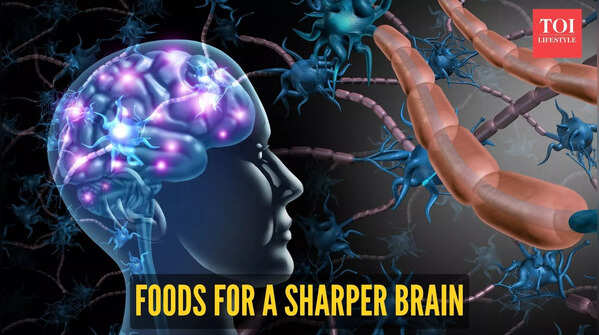- News
- lifestyle
- health-fitness
- diet
- Brain health expert ranks 10 foods for a sharp mind, and the right way to add them to our diet
Trending

1/13
How does food help sharpen our mind?
Maintaining brain health isn’t just about puzzles and meditation; it starts with what’s on the plate. Dr Theodore Henderson, Brain Health and Recovery Expert, rates common foods for their impact on cognitive…
- News
- lifestyle
- health-fitness
- diet
- Brain health expert ranks 10 foods for a sharp mind, and the right way to add them to our diet
Trending

1/13
How does food help sharpen our mind?
Maintaining brain health isn’t just about puzzles and meditation; it starts with what’s on the plate. Dr Theodore Henderson, Brain Health and Recovery Expert, rates common foods for their impact on cognitive function and emotional balance. His list is simple, yet backed by science, and includes some surprising everyday items. Here’s all we need to know about these foods and how to make them a natural part of a healthy routine.
2/13
Salmon
Salmon earns a “Big Ten” on Dr Henderson’s list. It’s packed with omega-3 fatty acids that improve memory, reduce inflammation, and support neuron function. How to add it: Include grilled or baked salmon twice a week. Pair it with leafy greens or a drizzle of olive oil for a full nutrient boost.
3/13
Leafy greens
Spinach, kale, and collard greens get a strong eight. They supply folate, vitamin K, and lutein, nutrients linked to slower cognitive decline. How to add it: Toss greens into smoothies, soups, or omelets. Lightly sautéing them in olive oil helps the body absorb fat-soluble vitamins better.
4/13
Nuts
Also scoring an eight, nuts like walnuts and almonds provide vitamin E and healthy fats that guard against oxidative stress. How to add it: A handful (not more) each day works well. Try crushed walnuts on salads or almonds as mid-day fuel instead of processed snacks.
5/13
Olive oil
At rank four, olive oil stands out for its high content of monounsaturated fats and antioxidants. It promotes healthy blood flow to the brain. How to add it: Use extra virgin olive oil as salad dressing or drizzle over cooked vegetables, avoid deep frying to retain nutrients.
6/13
Avocados
Avocados earn a solid five. They contain folate and vitamin B6, which support neurotransmitter balance and reduce anxiety. How to add it: Spread mashed avocado on whole-grain toast or blend it into a smoothie with spinach and banana for a creamy, nutrient-rich breakfast.
7/13
Dark chocolate
Ranked one on the list but powerful in small doses, dark chocolate enhances focus and mood thanks to flavonoids and magnesium. How to add it: Choose chocolate with at least 70% cocoa. Eat one or two small squares after lunch for a mental lift, avoid sugary bars.
8/13
Eggs
Eggs score two for their choline content, essential for producing acetylcholine, a neurotransmitter tied to memory and learning. How to add it: Poach or boil them to preserve nutrients. Pair eggs with vegetables for a balanced breakfast that keeps energy steady.
9/13
Oranges
Scoring two as well, oranges support brain cell protection through high vitamin C levels. How to add it: Eat one orange daily or add fresh orange slices to green salads. Vitamin C aids in the absorption of iron from plant foods.
10/13
Carrots
Carrots rank one but still hold importance for brain health due to beta-carotene, which protects brain cells from oxidative stress. How to add it: Snack on raw carrot sticks with hummus or roast them with olive oil for a sweet, crunchy side dish.
11/13
Red wine (in moderation)
Dr Henderson places red wine at three, only in moderation. The polyphenols in red wine, especially resveratrol, may protect neurons and improve circulation. How to add it: A small glass a few times a week, preferably with meals, may offer benefits. Non-drinkers can get resveratrol from grapes or berries instead.
12/13
Food first, supplements later
Whole foods work better than isolated nutrients. A varied diet combining protein, healthy fats, and antioxidants can reduce the risk of cognitive decline. Supplements should be used only under professional guidance.
No single food can make a brain “superior,” but consistent healthy choices can protect it over time. These ranked foods not only nourish the mind but also lift mood, enhance memory, and improve focus when consumed wisely.
13/13
Disclaimer
This article is for informational purposes only. It does not substitute medical advice. Individuals with specific health conditions or dietary restrictions should consult a doctor or registered dietitian before making significant dietary changes. Alcohol consumption carries health risks; no level of alcohol intake is considered completely safe.
Follow Us On Social Media
